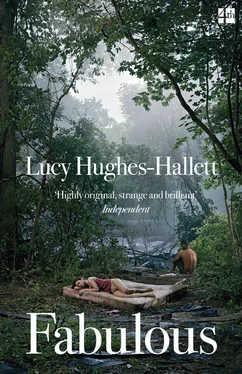The face was a perfect replica of her face. He touched it very lightly from time to time and felt the warm dryness of it, and he ran his fingers over her eyelids, and felt the fluttering movement beneath, just as though she was still there.
Milla left and other people came. A young couple, Eurydice’s nephew and his wife. They said to each other, ‘Shouldn’t we take him home?’ When he heard that he sang louder and for a while they let him be. When it was night, though, they led him down the long luminous corridors and out into the spangled dark.
They fed him and stayed the night in the spare room, her workroom, and when he sat up in bed and sang again the young woman came, wrapped in Eurydice’s cashmere shawl, and lay down on his bed beside him and held his hand and said, ‘You need to sleep. Sleep now. In the morning we’ll see if we can bring her back.’ He couldn’t remember how to sleep but he lay down when the niece made the pillows right for it, and then the singing moved from his chest to his mind, and all night his head rang with sounds as clear and dazzling as sunlit seawater seen by one swimming an inch or two under.
For most of his life he had been a middle-aged person’s kind of artiste. He sang, with his friend Marcia accompanying him, at the Maltings, the Wigmore Hall, places like that. He used to wear formal dark clothes, or sometimes, for Handel, silk frock-coats and breeches. He liked the costumes. He took a luxurious pleasure in the heaviness of lined and interlined satin. He enjoyed being someone other than himself. Then he accepted an invitation to sing with a group of clever young people who told him how much they admired him. He hadn’t much liked the music but he let his voice glide like quicksilver over the rough ground of the drums and sharp peaks of the electric guitars. Less than a week from first approach to recording studio, but afterwards strangers began to talk to him in shops. They were amazed, they said, by what he could do with his voice. As though they had no idea how often he’d done far better things, as though they had never heard of coloratura . ‘Enjoy it,’ said Eurydice. ‘Don’t grouch.’
There was a concert in Hyde Park. He wore ear-plugs – his hearing was precious. He stood at the back of the stage harmonising softly until it was time for his aria (they didn’t call it that). His voice, amplified, offended him with its coarseness. With the lights changing colour in his eyes, he couldn’t see. But he could sense the shuffle and sway of thousands of people on their feet. This is dangerous, he thought. He detested demagoguery. Afterwards he shut himself away to work on Purcell.
The next morning he woke early and slipped out of the flat without waking the young couple, even though the niece was still stretched out on his bed. When your life’s work is making exactly calibrated sounds and fitting them together in sequences whose tempi and tones you modify and adjust and rehearse and rehearse and rehearse, when you do that, day after day, your ear constantly straining to detect and eliminate the subtlest infelicities, you learn not to clatter about.
People were always taking his arm, but they did so to steer him, not because he needed to be propped up. He had piano-player’s shoulders and the leg muscles of one who could stand stock still throughout a recital. He let himself be steered. He’d learnt long ago that it was wise to abdicate power over tedious matters to another. To Eurydice. But that didn’t mean he was feeble.
There were a lot of elderly men around the hospital. They hovered near it. They stretched out on benches under the concrete overhangs. They leant against its walls to smoke. They went tentatively into the halls and waiting areas. As they ventured indoors they were wary but this late on in the night shift no one had the will to shoo them away. Or the heart. There were chairs in the hospital, and there was light. Hard plastic chairs and harsh shadeless light, but beggars can’t be … Once inside they could attend to their feet. Their feet were of great concern to them. They cosseted them. They swaddled them in cloth. They went into the washrooms and anointed them with warm water and disinfectant gel. Some of them had big trainers, shiny white shoes made for athletes, but here nobody sprang, nobody leapt.
He went among them, another suppliant. He passed softly through the dim entrance hall. The floor was hard, so that to walk on it was to make noise. The low ceiling was insulated with white stuff that swallowed the noise up. Sound. Smother. A closed system. He nodded to the gatekeeper, a woman who glanced at him briefly and saw that he was admissible, and let him go by. He was, as he always was, neat, and he stepped carefully over the slick grey ground.
He went upstairs to where they had said she was, to the bed where her abandoned body had lain, but there was nothing there. Not an empty bed even. Nothing. On other beds women slept, pale, their hipbones and feet making ridges and peaks in the thin cellular blankets. They snored or muttered and tiny sharp lights blinked.
‘You’re looking for your wife.’ A nurse. Male. African. Very large.
‘She was here.’ He no longer felt certain he had come to the right place.
Amidst the dimness the nurse sat in a cone of light.
‘There were concerns. She’s under observation. She’ll be going to imaging shortly.’
‘Can I see her?’
‘Best to wait here, sir. She’ll come back here.’
All that day he sat in the ward, by the window. The nurse gave him his chair again and brought him a plastic pot of yoghurt. The sun rose showily, unfurling streamers of lurid orange cloud while the sky faded. No sound from the outer world passed through the sealed glass. Visitors arrived. A Frenchman, with clever eyes and pendulous doggy jowls, came and sat beside his thin wife, and the two of them worked together on a crossword. A woman whose soft arms and shoulders billowed around her apologised and apologised. Sorry for the trouble. Sorry for the moans she couldn’t help but make. Sorry for the retching that from time to time possessed her. The nurses tended to her, unshaken alike by her pain and the pointlessness of her sorry sorry sorry.
Milla found him. ‘We were frantic. We didn’t know where you’d got to.’ As though he might have been anywhere else but here. Here, waiting for Eurydice. Here, watching by the crack down which she had been dragged into the underworld. Milla bustled about and asked questions, and went on a long excursion into another part of the hospital and returned to tell him what he already knew. Concerns. Imaging. Wait here.
Milla was really very good. He’d always liked being taken charge of by bossy people. When Eurydice seized his hand long ago and said, ‘You. You’ll dance with me, won’t you?’ and looked in his face so that he knew at once that she could see him, all of him, and found parts of what she saw absurd and other parts precious, he had said ‘Yes’, said it with every fibre of his being, every droplet of his being, every inter-molecular current and electro-magnetic charge and neural pulse of his being, with all the ardour that was in him, with his whole heart.
Milla was walking towards him, with two people he didn’t know, both in uniform. She squatted down beside his chair, rocking awkwardly on her high heels. Why on earth did women wear those things? Eurydice never did.
Milla said something. Her mascara had smeared all around her eyes. What she said was incomprehensible.
The floor gaped open and down he flew.
God almighty, what a racket.
He’d had a scan once. He’d taken off his proper clothes and, dressed in a penitent’s thin smock, had been borne away into the white enamelled throat of a machine. The noises it made were rhythmic and various. It roared and chugged and emitted long dragging sounds that had no trace of voice in them, because a voice can belong only to a being, and this thing was devoid of intention, devoid of life. He hadn’t been afraid then, just very lonely because Eurydice hadn’t come with him, and he’d been collected enough to think, You could do something with this. This is interesting. Why hasn’t a composer picked up on this? Perhaps someone has. This is imaging. This is the sound of a thing which looks at you without passion or compassion or even dispassion and – oddly enough – it’s musical.
Читать дальше











